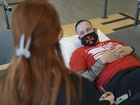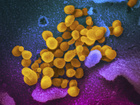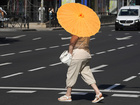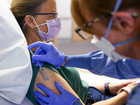A government watchdog agency in France has ordered Apple to withdraw the iPhone 12 from the French market, saying it emits levels of electromagnetic radiation that are too high.
The National Frequency Agency, which oversees radio-electric frequencies as well as public exposure to electromagnetic radiation, called on Apple in a statement Tuesday to "implement all available means to rapidly fix this malfunction" for phones already being used.
 Full Story
Full Story
For decades, preventing dengue fever in Honduras has meant teaching people to fear mosquitoes and avoid their bites. Now, Hondurans are being educated about a potentially more effective way to control the disease — and it goes against everything they've learned.
Which explains why a dozen people cheered last month as Tegucigalpa resident Hector Enriquez held a glass jar filled with mosquitoes above his head, and then freed the buzzing insects into the air. Enriquez, a 52-year-old mason, had volunteered to help publicize a plan to suppress dengue by releasing millions of special mosquitoes in the Honduran capital.
 Full Story
Full Story
First lady Jill Biden tested positive for COVID-19 Monday but is experiencing only mild symptoms, her spokeswoman said.
President Joe Biden was tested for the virus following his wife's positive test, but his results were negative. White House press secretary Karine Jean-Pierre said the president would continue testing regularly and would be monitored for symptoms.
 Full Story
Full Story
Santos Brizuela spent more than two decades laboring outdoors, persisting despite a bout of heatstroke while cutting sugarcane in Mexico and chronic laryngitis from repeated exposure to the hot sun while on various other jobs.
 Full Story
Full Story
Firefighter and paramedic Mike Camilleri once had no trouble hauling heavy gear up ladders. Now battling long COVID, he gingerly steps onto a treadmill to learn how his heart handles a simple walk.
"This is, like, not a tough-guy test so don't fake it," warned Beth Hughes, a physical therapist at Washington University in St. Louis.
 Full Story
Full Story
The National Institutes of Health is beginning a handful of studies to test possible treatments for long COVID, an anxiously awaited step in U.S. efforts against the mysterious condition that afflicts millions.
Monday's announcement from the NIH's $1.15 billion RECOVER project comes amid frustration from patients who've struggled for months or even years with sometimes-disabling health problems — with no proven treatments and only a smattering of rigorous studies to test potential ones.
 Full Story
Full Story
A sickly ginger kitten named Bebe is pulled out of a cat carrier at a veterinary clinic in the Cypriot capital, Nicosia.
 Full Story
Full Story
Australian researchers have diagnosed what is believed to be the first professional woman athlete with the degenerative brain disease chronic traumatic encephalopathy (CTE).
 Full Story
Full Story
Spain sweltered in its first official heat wave of the year on Monday as the government announced a new department to investigate and alleviate the effects of extreme temperatures on human health.
The state weather agency, AEMET, said temperatures were predicted to hit 44 degrees Celsius (111 degrees Fahrenheit) in the country's south during the hot spell, expected to last until Thursday, and noted that heat waves have become more common during the month of June over the last 12 years.
 Full Story
Full Story
The next big advance in cancer treatment could be a vaccine.
After decades of limited success, scientists say research has reached a turning point, with many predicting more vaccines will be out in five years.
 Full Story
Full Story



